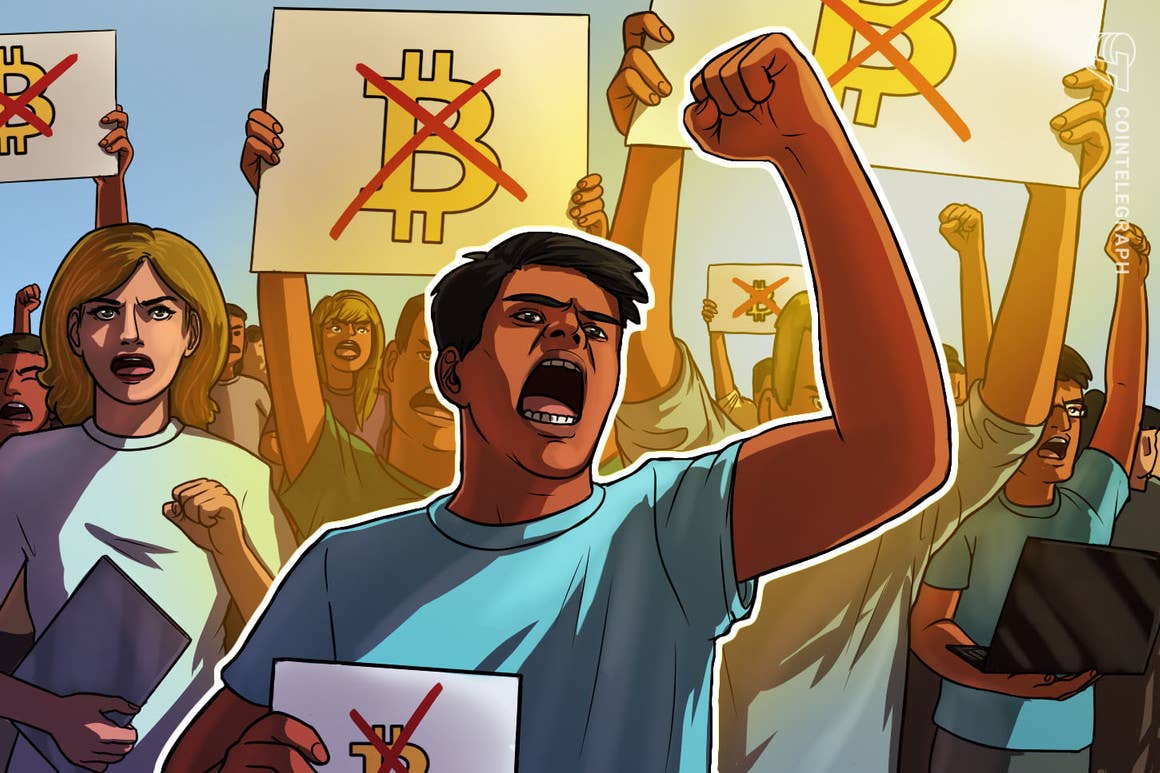The year 2021 will probably go down the history books as one of Bitcoin’s (BTC) most interesting years, given its recent uptake by billionaires and

The year 2021 will probably go down the history books as one of Bitcoin’s (BTC) most interesting years, given its recent uptake by billionaires and adoption by mainstream institutions, not to mention El Salvador’s move to make it legal tender.
In El Salvador’s case, it almost seems as if the whole world is watching this experiment to see whether it will be a success or a total failure for the Central American nation.
With Sept. 7 marking the official implementation of Bitcoin as a legal tender in El Salvador, a wave of protests in the country against the move has roused suspicions and uncertainty over how the new law will be enforced.
From the arrest of individuals criticizing the Salvadoran government over the new law, to the wave of citizens across the country protesting Bitcoin’s legal status, the seminal crypto is facing some headwinds.
How Bitcoin became legal tender
It all began in early June after Salvadoran president Nayib Bukele announced in a tweet that the country’s legislative assembly had passed a bill making Bitcoin legal tender. The law was set to be implemented on Sept. 7 and would see the country’s 4.5 million citizens able to make purchases with Bitcoin at stores nationwide.
In his announcement, Bukele said that once an official bill to make Bitcoin legal tender was passed, “Chivo ATMs” — Chivo being the name of the official BTC wallet for El Salvador — would eventually be “everywhere” in the country. This would allow El Salvadorans to withdraw Bitcoin in cash without incurring any commissions on their holdings, as is the case with services such as Western Union.
Moreover, Bukele assured citizens that no one will be forced to use Bitcoin. In a statement, the 40-year-old president said that “someone can always queue up at Western Union and pay a commission.”
“What if someone doesn’t want to use Bitcoin? [Well] don’t download the app and continue living your normal life. Nobody is going to take your dollars,” he said.
The first wave of resistance
Following the announcement, a group of protestors called the Popular Resistance and Rebellion Block (BRRP) block emerged to protest against the Bitcoin law.
“President Nayib Bukele passed the law making the cryptocurrency legal tender in the country without proper consultations with the people,” one activist said.
Although the protest group highlighted complexities such as Bitcoin’s volatility as reasons for caution, their main claim is that the law mainly serves large businesses linked to alleged money laundering to the benefit of corrupt officials.
“Bitcoin only serves some large businessmen, especially those linked to the government, to launder ill-gotten money,” one protestor said.
A letter from the BRRP group said that “entrepreneurs who put their capital in Bitcoin will not pay taxes on their earnings and the government would spend millions worth of taxes to execute the whole campaign.”
Indeed, the bill to make Bitcoin legal tender includes some interesting proposals such as a zero capital gains tax on BTC. The bill also promised investors permanent residency in the country with a three BTC investment in El Salvador.
The arrest of Mario Gómez
As the controversial Bitcoin bill became a law on Sept. 7, both supporters and detractors continue to emerge with the latest in events around the law being the arrest of Mario Gómez.
According to several local news outlets in El Salvador, Mario Gómez — a computer and crypto expert as well as an avid critic of the government — was arrested by local police and held for a few hours before being released.
Gómez has been known to regularly post on social media opposing the government’s move to make Bitcoin legal tender.
Observers such as Steve Hanke — an economist from Johns Hopkins University — criticized Gómez’s arrest as an “authoritarian police tactic in action.”
Hector Silva, a counselor of the mayor’s office in San Salvador, said, “the arrest of Mario portrays the fragility of the government in terms of the implementation of the Bitcoin law but confirms something even more dangerous.”
“They are willing to manipulate whatever institutions are necessary to push critical voices out of the way,” added Silva.
Although the police released a statement saying that Gómez was detained as part of a financial fraud investigation, news reports showed that he was arrested without a warrant and an attempt was made to take possession of his phone and computer.
The citizens’ protest
Right before Gómez’s arrest, retirees in El Salvador took to the streets to protest, worried about the government using the volatile cryptocurrency to pay their pensions.
While speaking to reporters, one demonstrator from the crowd — which included veterans, disability pensioners, workers and retirees — said, “we know this coin fluctuates drastically. Its value changes from one second to another, and we will have no control over it.”
While Bukele has promised…
cointelegraph.com
